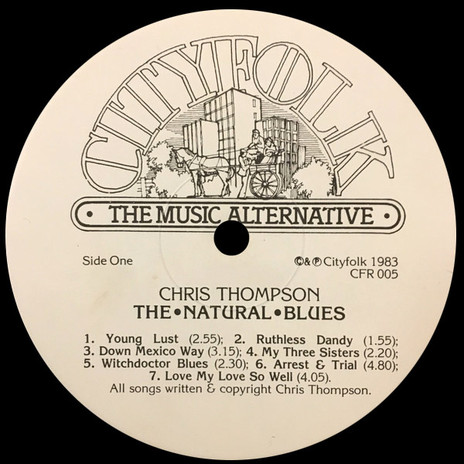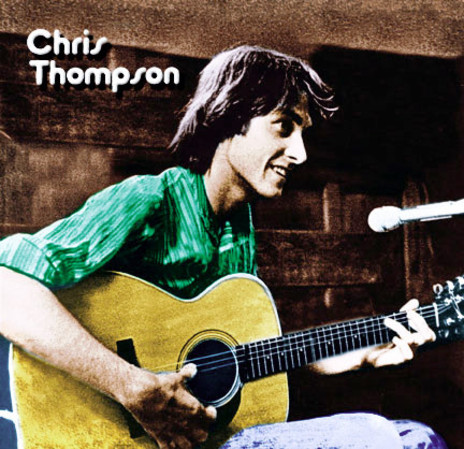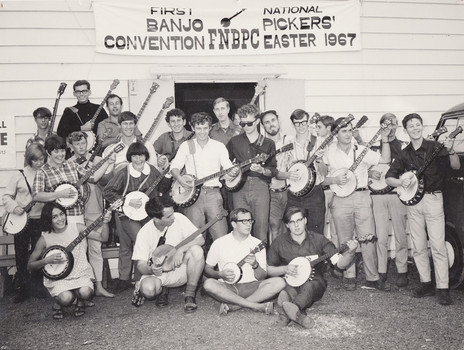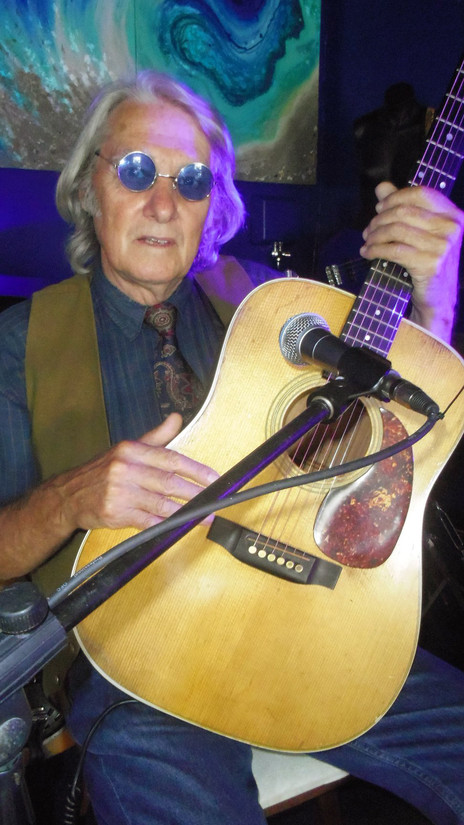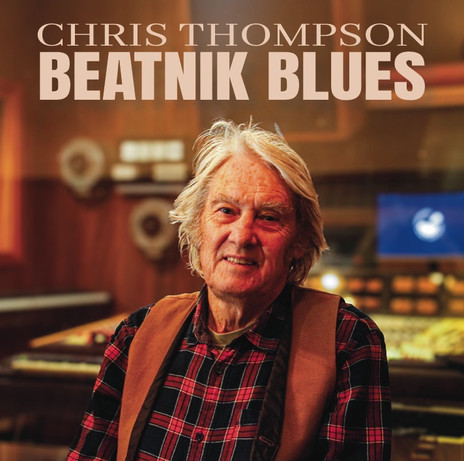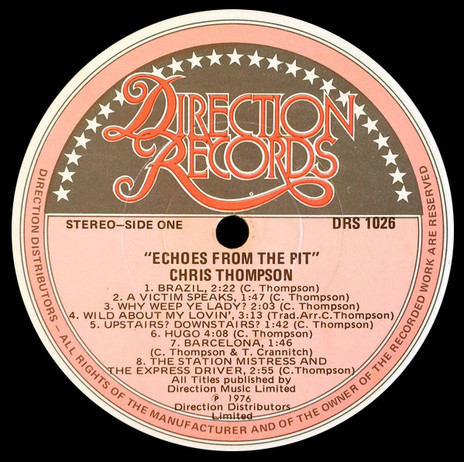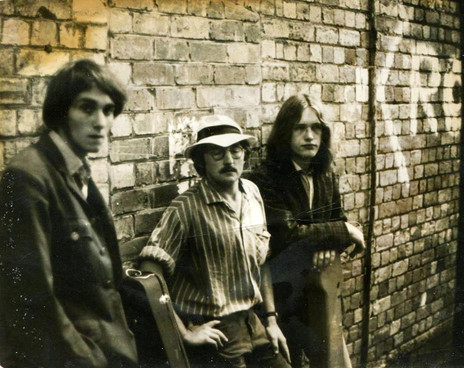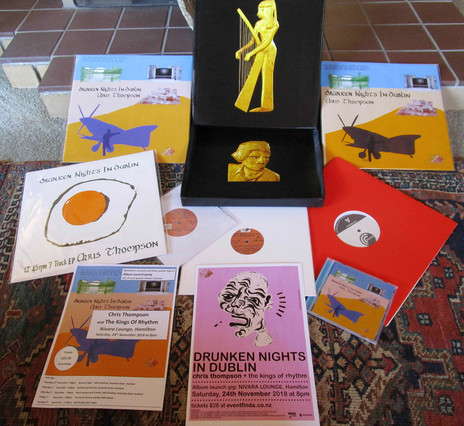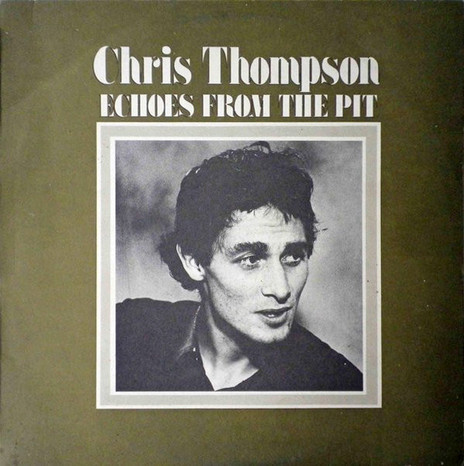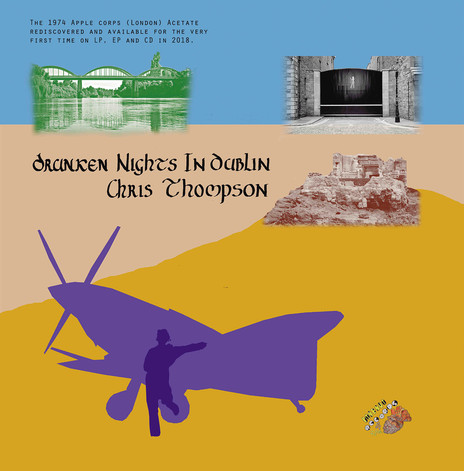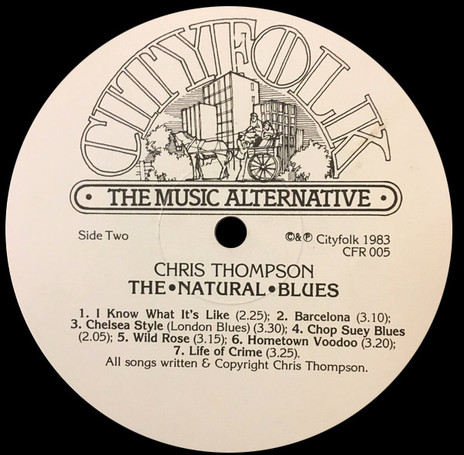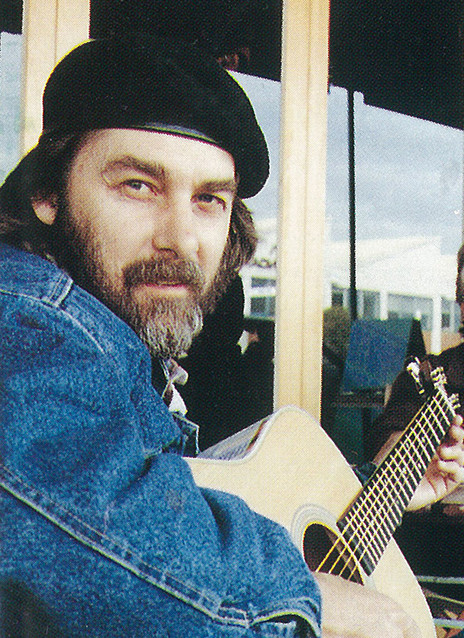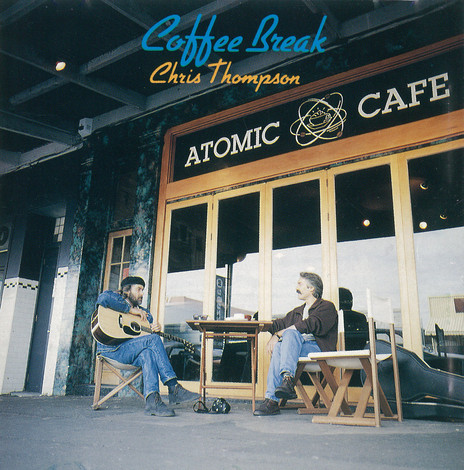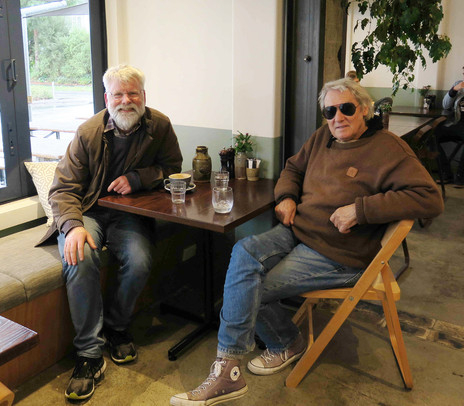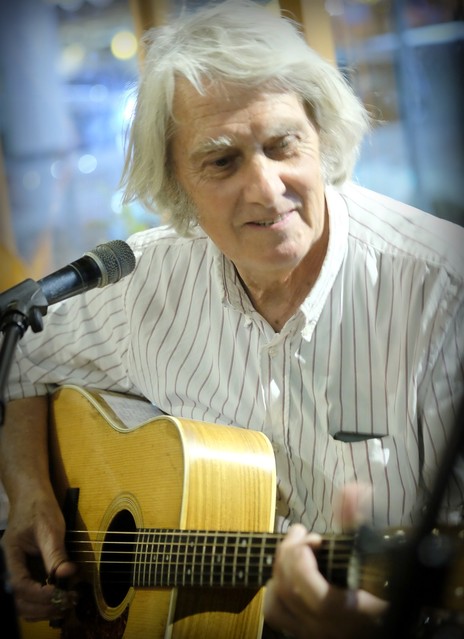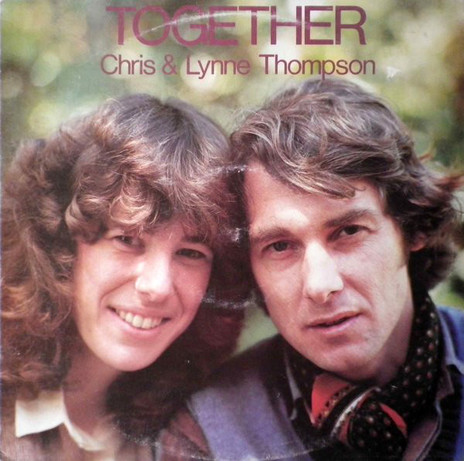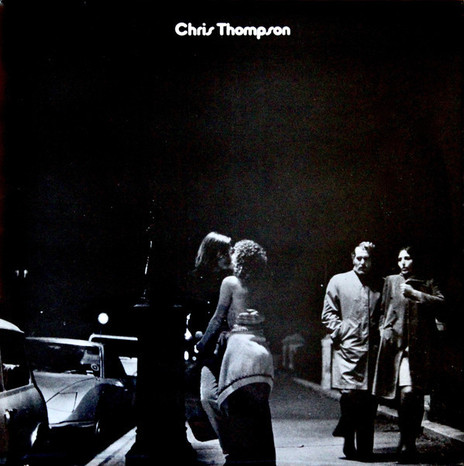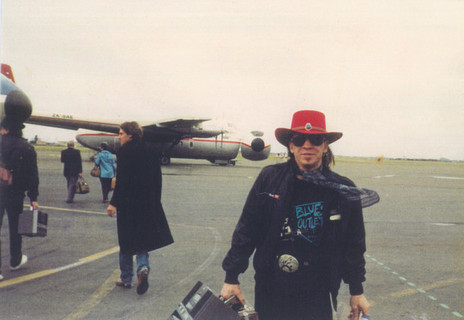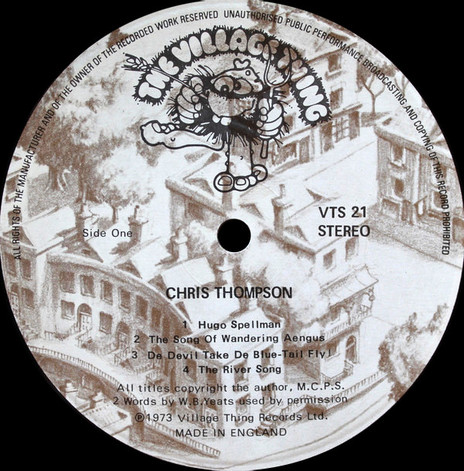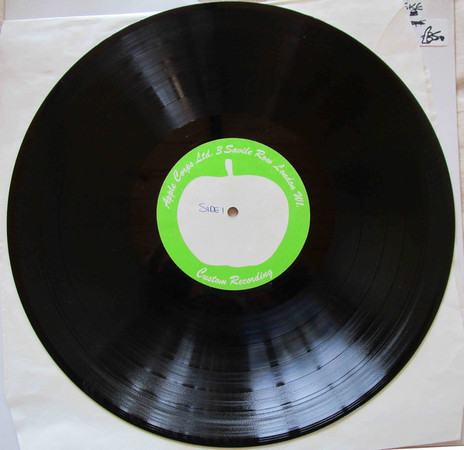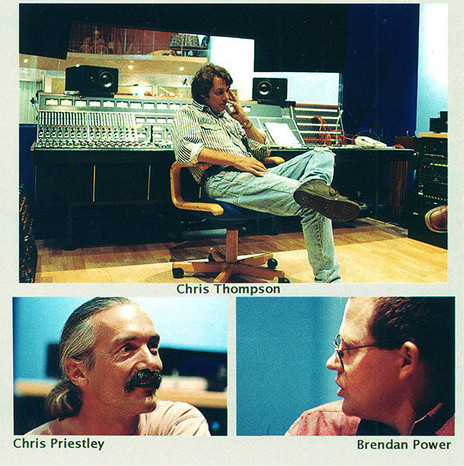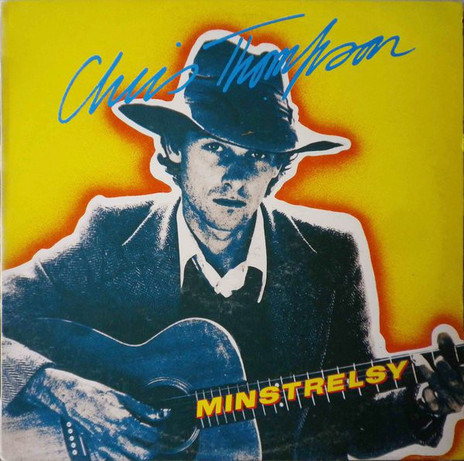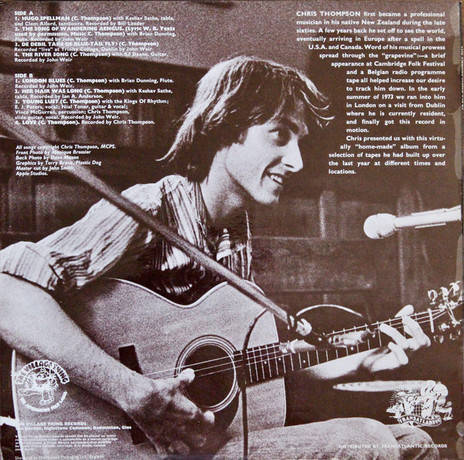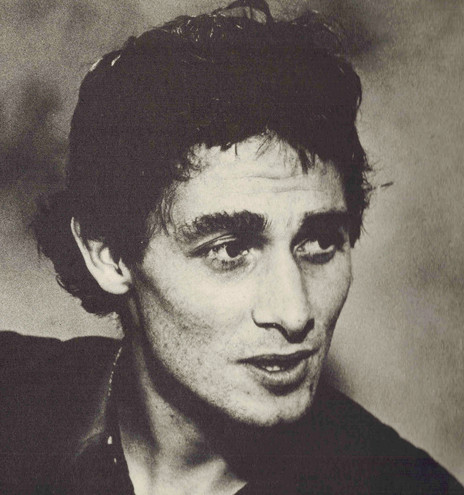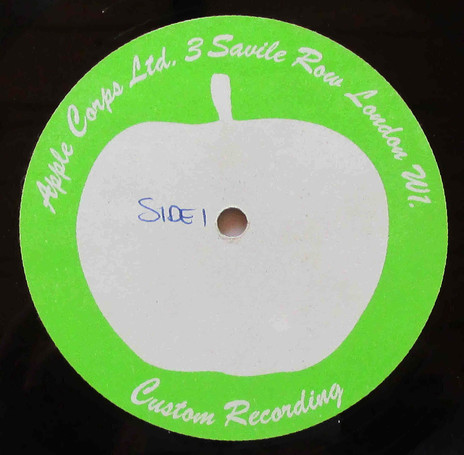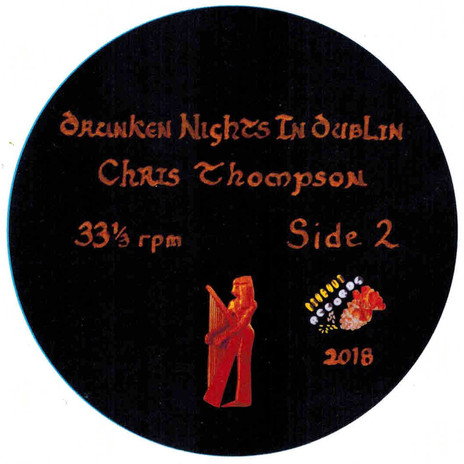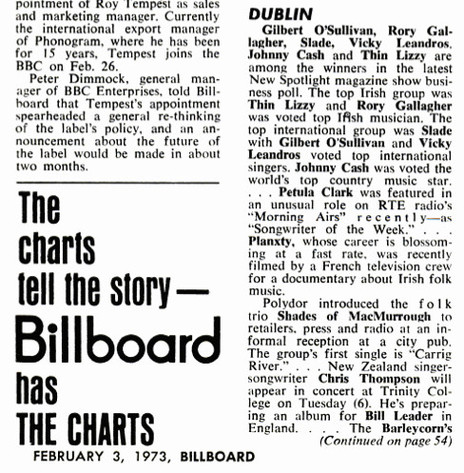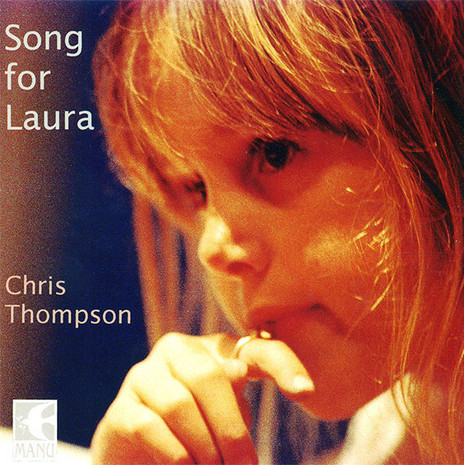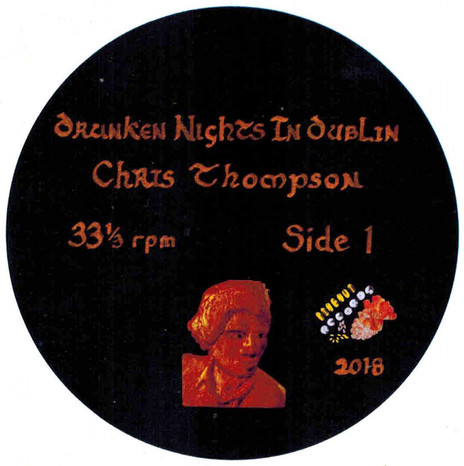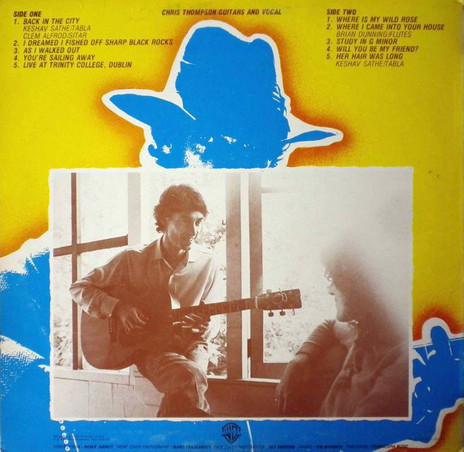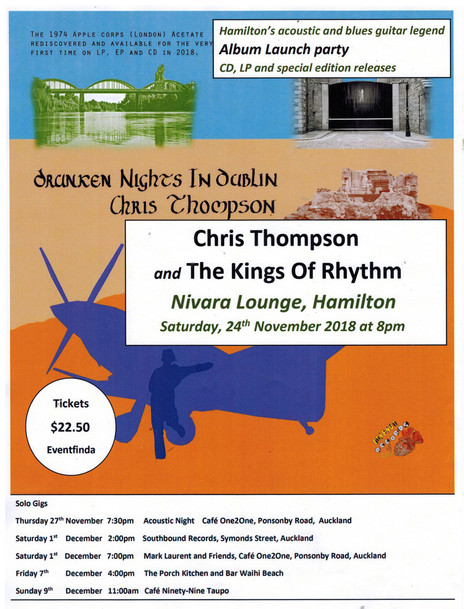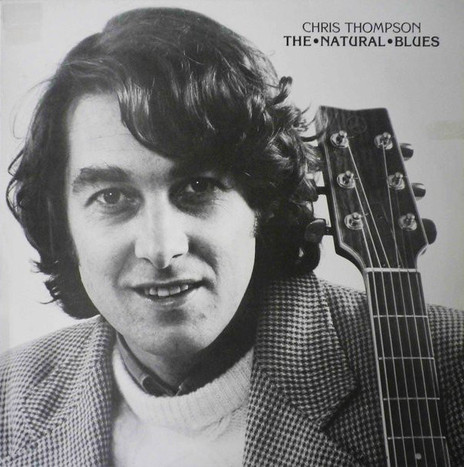Staunchly Hamiltonian – even composing The Fountain City’s unofficial theme song – Thompson was actually born in Auckland in 1951. “My earliest musical memories are of my mother’s records,” he told AudioCulture in 2018. “Soundtrack albums from shows like Oklahoma! and My Fair Lady.” His mother played the piano (as did his grandfather), along with flute and harmonica. The family encouraged his interest in music, and at his local Southwell School the young Thompson learned to sing.
Moving away from the school songs and movie musicals, his green ears were freed by the far-away wagons and canyons of American gunfighter ballads. “Back in the 50s, before TV, we’d hear Marty Robbins, Hank Williams and Johnny Cash on the radio, and marvel at the concept of freedom and the wide-open spaces,” he explains in the liner notes for the 2010 reissue of Chris Thompson on Sunbeam Records.
By great good fortune, the Thompsons neighboured with members of The Hamilton County Bluegrass Band, and the boy soon started to play guitar, fostered by HCBB’s Dave Calder. He played some school concerts, and soon joined Hamilton’s Kon-Tiki Folk Club, performing songs by Tom Rush and Woody Guthrie. In 1967, the 16-year-old Thompson attended and performed solo at the first National Banjo Pickers Convention near Hamilton.
The next year, Thompson moved to Auckland for University – and for venues such as The Poles Apart and The Wynyard Tavern. “I played there a lot over the years and had many inspirational evenings watching guitar players like Pitt Ramsay and Paul Marks, and bands like The Mad Dog Jug Band and the HCBB. I remember being at The Tavern on the night that the HCBB were recording a ‘live’ album, in 69 or 70 … it was a lively occasion but I was by myself and tripping on acid and didn't enjoy it at all! I don't think it was my imagination either because the resulting album was not as good as their Live at the Poles Apart LP, which contained more of their original folk and country repertoire.”
Aside from solo sets, Thompson starting gigging in groups. Among them was the Stillwater String Band, with his friend and neighbour from Hamilton, Lester Calder (David’s brother) on double bass, Bob Preston on guitar and Graeme Winn sawing the fiddle. The Stillwaters played pure old-time string band and bluegrass music à la The Greenbriar Boys and The Dillards.
“I also played in blues bands like The Myers Park Shufflers and worked in Lewis Eady's Music Store in Queen Street for a while,” he recalled in 2018. “I remember being tickled pink when Harvey Mann [The Underdogs, Space Farm, and later, Living Force] said hello and bought a guitar pick! I considered becoming a bass player but then I hooked up with Robbie Laven (Red Hot Peppers) and we became a duo like The Incredible String Band. I played a lot of gigs in various ensembles, backing up singers like John Hayday and Graham McGregor, and I often played at The University Folk Club and the Devonport Folk Club as well.”
Mixing in this fertile crowd he first heard the sounds of British fingerstyle, from folk heroes such as Bert Jansch and Davey Graham, which would become his next major influence. And this education beat his tertiary studies. “I had no idea what I wanted to study at Auckland Uni in 1968 – it was too much like school to be very interesting – and it wasn’t long before I became a professional musician and hit the Owl Hoot Trail.”
And it paid off. Thompson was on his way to a lifelong career as a professional musician, with semi-regular solo television appearances on AKTV-2's On Camera and penning jingles for shampoo, air freshener, and jeans. “I started doing TV shows in 1969 when I was spotted by a progressive TV producer, Mike Hockley, who gave me a lot of work. In those days TV paid good money (Musicians Union scale) for appearances.”
Playing a support gig for Julie Felix changed Thompson’s life.
Also in 1969 Thompson joined Chris Parfitt’s Medicine Show with Brett Neilsen (The La De Da’s) and Tony Blomfield (Ray Woolf and the Avengers) among the roster. Parfitt had been in The Hi-Revving Tongues; his manager Barry Coburn offered Thompson a support slot for a Julie Felix concert in Nelson in 1970, an event that would change his life: “I got on very well with Julie and her manager and they told me that if I came to England, which I was thinking of, that they would see that I would be welcome there.”
He stopped just thinking about travelling and jumped right in. For the next 18 months Thompson toured the British Isles as the guitarist for Felix’s three-piece backing band. In 2018 he recalled: “[My] best memories of playing with Julie are the times we spent in her house in the country, rehearsing and smoking hashish and listening to her amazing record collection. I learned some good tunes from Julie, traditional songs like ‘Geordie’, and a Spanish tune called ‘El Pescador’ which I used for a song I wrote later called ‘Barcelona’.” Thompson can be heard on Felix’s John Paul Jones-produced, Abbey Road-recorded Clotho’s Web album, where he was brought in on second guitar.
The touring group also featured The Pentangle’s Danny Thompson (no relation) on bass, and the Felix, Thompson and Thompson trio played ‘Moonlight’ on Top of the Pops, 17 June 1971. “Danny Thompson was, and probably still is, a riotous larger-than-life individual. It was no wonder that he hooked up with John Martyn – they were made for each other. Danny was involved with some bad drugs, he was the first person that I ever saw snorting cocaine, and that wasn’t my thing. However, he was kind and helpful, and treated me like a younger brother.”
Outside of the town halls and theatres of touring, and now London-based, Thompson did his own thing too. While playing some solo sets at Les Cousins and The Troubadour he first met legendary folk revivalist and fingerstyle-player Davey Graham. Thompson recalled in the Sunbeam liner notes, “I had just composed ‘Hugo Spellman’ [and] I was intending to play it that night. While tuning up, I was introduced to Davey. We hit it off, so I asked him if he’d play with me. To my everlasting surprise, he said yes. So with a minimum of rehearsal and preparation, a few minutes later I was performing with one of the all-time greats – and a nice guy as well.”
Felix’s touring percussionist, tabla player Keshav Sathe, introduced Thompson to tamboura player Clem Alford, his bandmate in the pioneering British psych-prog-folk group Magic Carpet. Soon Thompson was recording ‘Spellman’ with them for producer Bill Leader; the track would become the opening song on his legendary, nearly forgotten, first album. Thompson recalled in 2010: “Davey’s interest in Indian music, and my association with Keshav Sathe, determined my explorations of ‘fusion music’ – the combination of Eastern and Western instruments. Kesh was a marvellous man who’d played with just about everyone (including Davey on Godington Boundary and George Harrison on Wonderwall Music) and he and I spent many hours together playing and listening to music. That’s why, when we came to record ‘Her Hair Was Long’ for Ian Anderson in Bristol in 1972, the improvisation was done with such confidence in each other’s ability.”
Thompson’s solo material was starting to come together, so it was time for him to move on. On his Facebook page he recalled, “I played in Julie's touring band for a while, got to meet some cool people … we did some good gigs too. Julie was fun when she was stoned, and a good entertainer, but she was into witchcraft, and that was kind of freaky … when she proclaimed herself a goddess in 1971, I split for Ireland.”
“Julie FELIX was fun when she was stoned, and a good entertainer ...”
Thompson had met some sociable folks in Dublin when he had toured there with Felix, so he gave Ireland a go. In 2010 he recalled that some students from Trinity College, Dublin – where Thompson was to shortly become musician-in-residence – “loved my music and invited me to set up house with them in Terenure after I’d played one of the best solo concerts I’ve ever done, in the Junior Common Room at Trinity.”
He supported compatible bands such as Quintessence, Planxty and Horslips, and a handy garden shed made a good studio. Soon Thompson started to rehearse and record both solo and with friends and colleagues. Two of these early songs from the shed ended up on a 1974 Irish sampler album called First Thrust, and a session with his band The Kings of Rhythm produced the splendid, slinky foot-stomper ‘Young Lust’, included on his debut solo album. Other songs from these woodshedding days would end up on 1976’s Echoes from the Pit, and the 2018 release Drunken Nights in Dublin.
Felix’s band had often borrowed a PA, van and even roadies from groundbreaking baroque folk-jazz group The Pentangle. They saw a lot of each other, and Pentangle guitarist Bert Jansch told Thompson he liked his music. Thompson gave him the tape he had made with Bill Leader, and Jansch rewarded him with insightful comments, general encouragement – and a recommendation to Belgian tour promoters. Thompson headed to the continent for his first European tour, playing Belgium and Barcelona, Amsterdam and Avignon, where he met lifelong friend, the celebrated guitarist and folk interpreter Wizz Jones.
Back in London in 1973 to catch a performance by Clarence White and the Kentucky Colonels, Thompson serendipitously met Ian A Anderson: not the Jethro Tull flautist, but more fortuitously the head of “alternative folk label” Village Thing records (and editor of fRoots magazine since 1979), who shared a distributor with Bill Leader’s Trailer label. Anderson invited him to record a solo record; in the liner notes of Ghosts from the Basement (2010) he wrote that word of Thompson’s brief appearance at Cambridge Folk Festival, plus “rumour and radio tapes from Belgium had reached us and I eventually bumped into him in a London club where he was visiting Wizz Jones.”
Recorded between 1971-73, and comprising home recordings, and recordings produced by Leader, Anderson, and John Weir (producer of the First Thrust record), the reputation of Thompson’s self-titled debut album has grown exponentially since it initially dropped – or rather, flopped. “Frustratingly,” wrote Anderson, “distributors at Transatlantic ‘lost’ most of his album pressing in an insurance scam and only 101 copies were sold.” The Pentangle’s LP Reflection had failed to sell as well as expected, and 899 of the 1000 pressed copies of Thompson’s premiere were reportedly dumped into a canal. “I well remember John Renbourn telling me that it had ‘made a splash’!” said Thompson.
Though girdled with the dubious distinction of The Village Thing’s worst selling record, the album now rates as a sought-after psych-folk classic, and its timeless tracks continue to pepper Thompson’s own subsequent records – as well as being covered by both his contemporaries and 21st century acid-folk revivalists.
Dumped when first released, Thompson’s debut LP now rates as a sought-after psych-folk classic.
When Chris Thompson was re-released in 2001 by Massachusetts label Scenescof, accompanying material described it as “shimmering, hypnotic, flowing, psych-tinged … a window into time gone by, evoking both a spatial and temporal quality that contemporary music oft seeks to emulate or revive, but will not come our way again.”
It is an astonishing document, its songs singularly resounding. The centrepiece, ‘London Blues’ (aka ‘Back in the City’, aka ‘Chelsea Style’ aka ‘Beautiful People Blues’) is the album’s crux, an antipodean take on Orwell’s Down and Out in Paris and London or Colin Wilson’s Adrift in Soho, or the 1960s histories of Paul Simon and Jackson C Frank. Thompson’s entire oeuvre and ideology are candied into this one sweet sad track: a seductive, fingerpicked melody supports an instantly familiar story of a bright-eyed young New Zealander, world-weary if only weeks into his London OE, in love with someone and with life, and bored of those pompous, flash Englishmen.
It’s a true “first album”, an artist’s miscellany of all the best songs written in all the times and places leading up to its release – 1960s Auckland, 1970s London and Dublin – and unafraid of its influences. Inspired by Steve Winwood’s piano style on ‘John Barleycorn Must Die’, Thompson’s interpretation ‘De Debil Take De Blue-Tail Fly!’ was recorded live at Trinity College, while ‘The River Song’ grew out of ‘The Fire Sermon’ from TS Eliot’s The Waste Land. ‘Her Hair Was Long’ was composed in Auckland but recorded with Keshav Sathe in one astonishing take by Ian A Anderson at Village Thing’s studio, Frenchay (a former Quaker meeting house near Bristol). The guitar playing was inspired by John Renbourn, the lyrics by Tolkien’s ‘The Song of the River-Maiden Nimrodel’.
The album cover is a full-square black and white candid photo taken in Paris, showing Thompson with his girlfriend Mu’kee, who is described by Scenescof as “a famous groupie, Monique Brossier, aka ‘The Girl’ or ‘Girl Freiberg’, whose friends in San Francisco and LA included Quicksilver Messenger Service, the Byrds, Crosby Stills & Nash, etc.”
Thompson left Europe in 1974 before the album was released, travelling via the States to visit Mu’kee; he saw John Lee Hooker perform and found time to write a couple more songs which would end up on his next record. “I was heading back to New Zealand with the master tapes, hoping to get them released here,” he recalled in 2010. He returned to New Zealand just in time for another brush with greatness. “I was holed up in a cottage on the farm. I'd just got the phone connected when Bruce Kirkland from NZUSA [the national students’ association] rang and asked me did I want to tour with Sonny Terry & Brownie McGhee. I said, ‘Yes, I certainly do!’”
Opening the 10 concerts on the New Zealand leg of the duo’s two-week tour changed Thompson forever. He recalled the experience on Facebook: “Brownie was happy to reminisce about all the legendary musicians he and Sonny had known and he took me into his confidence, laughing about the time that Bob Dylan came to Sonny for harmonica lessons, talking about Howlin’ Wolf – during a taxi ride we took together through Hamilton on the way to the Founder's Theatre – and showing me a little of his remarkable left-hand guitar technique while we were jamming. I remember coming off stage in Christchurch after the first gig and they were waiting in the wings, Brownie beamed at me and said ‘Outta sight, Chris’, the first time I’d heard that expression. Jamming with Brownie in his hotel room in New Plymouth after the show, I learned more about playing the blues in about 10 minutes than I’d been able to figure out in my previous six years as a professional musician … after that session I went straight back to my hotel room and wrote my first 12-bar blues song.”
Brownie McGhee gave THompson an eye-opening 10 minute lesson in playing the blues.
In the Sunbeam label release notes Thompson says: “I’ll never forget Sonny joining in with me from the wings while I was onstage at the Regent Theatre in Dunedin doing ‘Dink’s Song’ – he’d been watching me play, and when he started wailing the audience went bananas, just knowing he was in the house.” Thompson cultivated a lifelong friendship with McGhee, and wrote him the song ‘Letter to Brownie’, which he sang to his old friend when McGhee later returned to New Zealand to play his last Auckland show.
Following this momentous tour, Thompson picked up some more TV session work, accompanied fellow travellers John Hanlon and Waves in concerts, and laid down the tracks for his debut on New Zealand vinyl. A strong second album Echoes from the Pit was released by Direction Records, the New Zealand independent label who released Waves’ LP and singles, as well as releasing local pressings of international psychedelic acts such as Pearls Before Swine and Soft Machine.
The first record having disappeared seemingly without a trace – at least until its 2001 reappraisal – Echoes offers three tracks from the master tapes of that record to the wider home audience: ‘Young Lust’, ‘Hugo Spellman’, and ‘Chelsea Style’ alongside ‘Wild About My Lovin’ (with The Kings of Rhythm), ‘Joshua Gone Barbados’ and ‘Fox’s Minstrel Show’ also recorded in Dublin, and new material recorded in Auckland with session musicians.
In a 1993 television interview on TVNZ’s City Life Thompson was asked to describe his music and performance: “Well I think of it as a sort of ‘magic theatre’ … It involves acting, and different personalities and characters will show in an album or performance of mine.”
The story-songs on Echoes from the Pit are the first act of this new theatre. Whereas his debut was more a bag of brilliant beginner’s luck, on-the-sleeve influences and personal reflections, these tracks bear the masks of comedy and tragedy in Thompson’s characterisations. Stand out new songs from the record included ‘A Victim Speaks’, with a jazzy rhythm section featuring the great Frank Gibson Jr and his Dr Tree bassist Bob Jackson, in which Thompson assumes the role of a grocer/revolutionary; the Fairport Convention-like ‘The Station Mistress and the Express Driver’, featuring vocals from Josie Rika and exquisitely tricky fingerpicking from Thompson; and a soulful Eric von Schmidt cover, ‘Joshua Gone Barbados’. It’s here too, that we first clearly hear the bitter side of Thompson, the teasing self-dramatist. While this crabbiness is manifest even in his timeless ‘London Blues’, it comes to the fore in his snickering, surly ‘The Story of My Arrest and Trial’.
Like the earlier record, Thompson’s major label debut Minstrelsy was again a bit of a 50-cent mixture, presenting some essentials from the absent debut, ‘Her Hair Was Long’, ‘Back In The City’ and ‘De Debil Take De Blue-Tail Fly!’, as well as a new take of ‘Upstairs? Downstairs?’ from Echoes ….
The album opens with ‘Back in the City’, the vigorous demo version of ‘London Blues’ with slightly different lyrics, backed on sitar and tabla by Alfrond and Sathe. Next is a stark fingerstyle tour de force, ‘I Dreamed I Fished Off Sharp Black Rocks’: an instrumental version of a vocal track originally recorded for the Village Thing record (the original version was included as a bonus outtake on both CD reissues of that first album).
‘Where Is My Wild Rose’ is another Thompson classic, full of longing.
The show-stopping new tune, though, was Thompson’s second absolute stone classic. ‘Where Is My Wild Rose’ is full of longing like ‘London Blues’ before it. On the folksong.org.nz website he wrote: “I'm just starting to see now why this song strikes a chord with so many people here. I had sidelined it as ‘a pretty Irish song, and not about New Zealand at all’ ... but I was wrong. Because no Irish writer could have written this. For an Irishman, Connemara and Killarney etc are not far-away places any more, as they are here in New Zealand. This song is about the feelings, the yearnings, the soul, of so many young men in the materially rich but spiritually impoverished 1960s world of Pakeha New Zealanders.” In 2011 Robin Pecknold of Fleet Foxes released a cover version of this song on his digital EP, Three Songs.
On the back of these two formidable albums, Thompson kept going: playing Nambassa in 1977 and 1978, and returning to Europe for a solo tour which, he wrote in the Sunbeam notes, “was good and made money, but times had changed all over the world (I blame disco!) and I barely got through the late 70s and into the 80s.”
Returning to Hamilton and a series of café residencies, Thompson got to work on his next release – and first cassette – Hometown Voodoo. While ‘London Blues’ may be his biggest hit in the big world beyond these shores, one track from the duo of love songs to his home city would become perhaps his most famous song in New Zealand (well, in Hamilton at least), thanks to a popular cover by Big Muffin Serious Band:
“Hamilton, Hamilton
Greatest little town in New Zealand
But I'd do anything to get away”
With its winking self-deprecation, despairingly glorifying the drudgery of small-town life, ‘Hamilton’ “delivered a fairly droll line in Kiwiana,” wrote Graham Reid in 2011, “… written in that lineage which started with Peter Cape's slightly drawling and nasal delivery about jokers and sheilas and carried on through Barry Crump's books and satirist John Clarke (aka Fred Dagg).”
The cassette was a success and sent Thompson touring for the next two years. Meanwhile, two tracks from his first album were included on a German compilation, Masters of the Folk Guitar, alongside tracks by Village Thing label-mates Wizz Jones, Al Jones, Dave Evans and Hunt & Turner.
On the back of the touring, ‘Hamilton’ and Hometown Voodoo, in 1982 Thompson was invited to add a few tracks to Paths, a compilation record for Cityfolk Record Co – a new label out of Hastings – with local folkers Kathryn Tait and Martin Curtis. This was followed up the next year with a solo LP on the label. “The resulting LP The Natural Blues did very well indeed,” he said in 2018, “it made money and was the first album I had that was a finalist in the New Zealand music awards.”
This was a new Thompson for the new decade: evolving through album cover portraits from the audacious raw romantic of the debut, to the tousle-haired rascal … from the Pit, to the fedora’d troubadour of Minstrelsy. Here was a respectably presented folk singer in a tweed jacket, cream jumper and collared shirt, straight off an early-60s Irish folk-revival record. Ever-restless, Thompson again re-worked several songs, in clean and smooth professional new productions, and chucked in some new folk-blues tunes too. ‘Ruthless Dandy’ features a giggling silken wail for a chorus, while ‘Down Mexico Way’ evokes Dylan’s Pat Garrett & Billy The Kid soundtrack. ‘Love My Love So Well’ brought new lyrics to a tune Thompson had had lurking since 1968 – and certainly sounds like a session from the self-titled launch.
The Natural Blues was, Thompson said later in the Sunbeam notes, “also instrumental in bringing me to the attention of CBS Records in Auckland who offered me the support gig for the Stevie Ray Vaughan tour in 1984. I hadn't actually heard of Stevie Ray Vaughan but I checked him out and thought ‘that would be exciting’ … and it was.” Thompson was the opener every night on the tour. “Those were big rock shows, and quite chaotic, but I did alright, especially in Christchurch and Palmerston North, where the crowd liked me and the sound was good. Stevie Ray and his band were good guys who took an interest in me and liked my music.”
Stevie Ray Vaughan and his band took an interest in Thompson and liked his music.
1984 also saw the release of Time On The Road, a Cityfolk record by Taranaki folk musician and historian Mike Harding, on which he covered ‘Chelsea Style’ and ‘Wild Rose’. That record also included flute accompaniment from Thompson’s future wife Lynne Bradstock. “I was something of a folk-rock star now, having recorded with bass and drums and had a few of my songs covered etc. Around this time I met … a flute-playing Canadian girl named Lynne, whom I married in 1985.”
Lynne Thompson had grown up with the piano, then moved to clarinet in her school band and guitar at Girl Guides. Picking up the flute following a shift to Australia, she soon moved to Auckland to study accountancy and administer the University Folk Club, and regular gigs followed at The Poles Apart.
After residencies at Bonne Cuisine restaurant and other Auckland cafes, the newlyweds toured the folk clubs as a duo and released their Chris & Lynne Thompson LP Together on Ode, which was a finalist in the folk category of the NZ Music Awards. RNZ recorded Chris & Lynne in concert too and released it on an Ode cassette. Together is Thompson’s lushest album, recorded mostly live to stereo with a full backing band, but the sound is rich and balanced – miles away from the mix of rough-and-ready shed tapes cheek-by-jowl with polished studio sessions making up the first three records. Chris’s contributions – like India-tinged album opener ‘The Journey to the East’ – are serious and sweet, quiet psych diamonds, devoid of his sometimes smirking acerbity. Lynne’s ‘Chris’s Song’ is a moving ode to her new man, backed by phonetic fretless bass, and she fills out her half of the tracks with five more charming love songs.
In 1987 the two Thompsons produced their daughter Laura (aka Lora) and moved to Raglan where, Chris recalled in the Sunbeam release notes, “for the next 15 years I toured and recorded regularly from my home base while enjoying family life and delighting in Lora’s company. She was then (and forever will be) my best little pal.”
The mercurial Thompson released his first CD, Coffee Break, on Ode in 1993. Two years later came Song For Laura, with supporting vocals and flute from Lynne, again a finalist in the folk category at the NZ Music Awards. These two albums enjoyed sales in Taiwan and the US, but Thompson’s biggest overseas swell had yet to break.
Thirty years after he started laying down the tracks for his first record, a tiny Massachusetts label called Scenesof Records (which had released some Wizz Jones records in the 90s) got in touch. Thompson told NZ Musician, “I was contacted by Charles Reynolds of Rockin’ World/Scenescof Records, who told me he that he was interested in re-releasing the album, and as one thing led to another, it appeared that not only was the master intact, but there was another reel of out-takes that could be used as bonus tracks – some of which I didn’t remember doing.”
The Chris Thompson reissue made a much bigger splash than the original release. The NZ Musician review said: “What a gem this is. All the feel of the late 60s London acoustic finger-style guitar genre is here, complete with sitar and tabla backing and a smooth young Thompson voice, yet to gain that cynical edge that so defines him now. It’s not even slightly dated. A compulsory addition to any serious NZ folk music collection.” Allmusic.com says of the disc: “Early-70s London was not exactly lacking for phenomenal folk guitarists, but even amid the likes of Bert Jansch, Nick Drake, et al, Thompson must have stood out … his fingerpicking technique rivals that of anyone on the scene at the time, and on stand-out tracks like ‘Her Hair Was Long’ (which was wisely repurposed a couple of years later on Thompson’s major-label debut), the New Zealander achieves an intensity of tone that only an artist like Jansch could match.”
Riding high on the reissue’s international interest, Thompson travelled to Nashville to meet his publisher, and also the man behind Scenescof. “It was starting to make money after 30 years and so I thought the least I could do was to say hello. Charles organised a few little gigs for me near Boston, in towns like Northampton and Hadley,” Thompson said in 2018. Thompson then went on to play in London as a guest of old pal Wizz Jones and “revisited Paris, playing at a jazz club and my old busking site at ‘The Rainbow Room’ – the connecting tunnel between the Metro and the mainline station at Etoile. I made a few euros, as in days of yore; only they were francs then.”
It wasn’t all good news though: Thompson’s marriage had fallen apart. “I went off the rails a bit, and was on the road for a couple of years, having some high old times, visiting old friends and making some interesting and experimental albums but I finally made it back to Lora and Hamilton,” he recalled on Sunbeam. Lynne continues to play both solo and in duo WilkieMac, and organises music events and workshops in Raglan.
The next several years saw more recording and residencies, new bands and styles, a Bandcamp site and more digital releases, teaching guitar at Matangi School – and a late return to university to earn a degree in Screen and Media Studies.
Thompson’s songs have been covered by Robin Pecknold of Fleet Foxes and Meg Baird.
And still that first album made more waves. In 2007, Philadelphia psych-folk revivalist Meg Baird recorded a cover of Thompson’s ‘River Song’ on her album Dear Companion, and in 2010, British label Sunbeam issued a new 2CD version of the debut. Seven years after that, a third reissue of the debut was released by South Korean label Merry Go Round, on heavy-grade vinyl with packaging and centre labels reproducing the original Village Thing release. It’s a generous (and expensive) pressing, in glorious high fidelity: captured is the tiny cough of a Trinity College audience member, and the song of every chittering bird outside that early-70s Dublin shed is preserved for avian posterity.
Thompson shifted from Hamilton back to Raglan, then to Taupo. In 2018 he is based at Waihi Beach, where he continues to record and perform. His most recent album of new material is a digital-only release called On High Street.
In the 2020s the master tapes of Thompson’s “lost” recordings of his early 70s Irish shed sessions have been rediscovered on a surviving acetate made by Apple Corps, the Beatles’ label. The acetate was filed away at EMI in Middlesex, stored in a Soho record store, transferred to another specialist record shop where it was kept for the next 20 years, then finally sold on eBay in 2018. New Zealand label Pinenut Records released the historic album, Drunken Nights In Dublin, on vinyl and CD in late 2018.
Chris Thompson passed away in November 2024, aged 73. Three months before he died, he recorded his last album, at Stebbing's. It was called Beatnik Blues.
